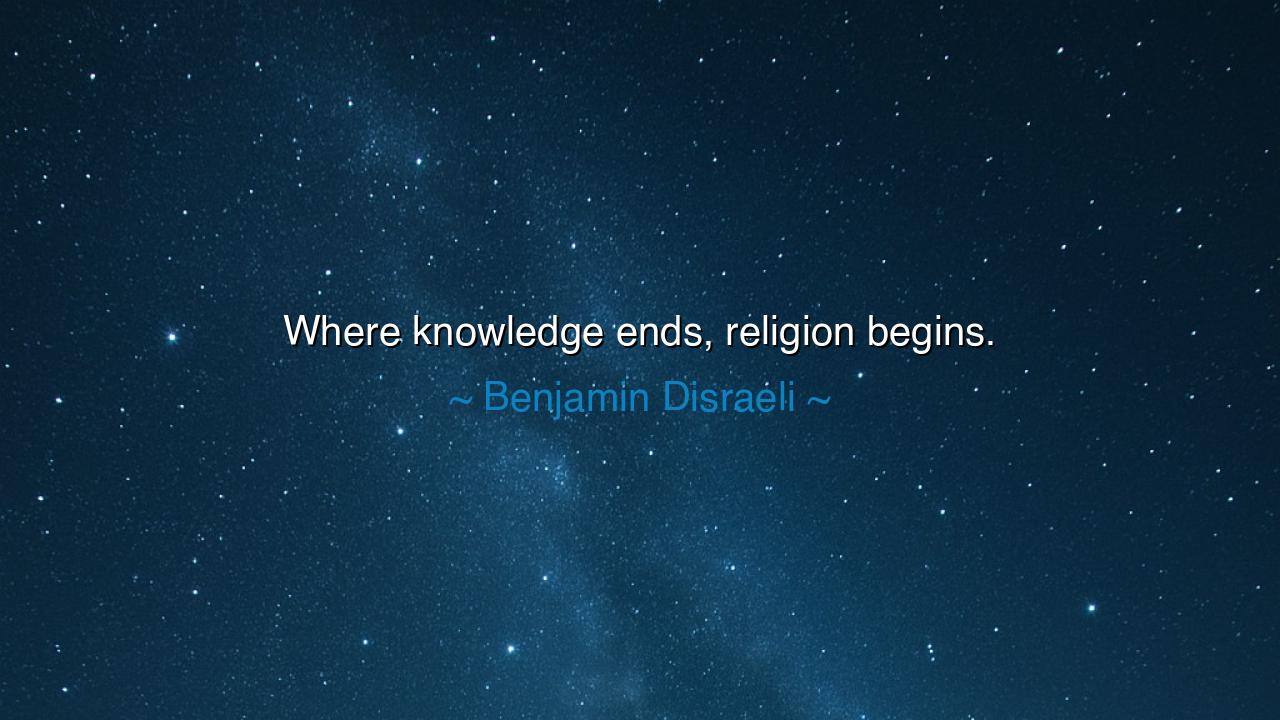
Where knowledge ends, religion begins.






Hear, O seekers of wisdom, the solemn words of Benjamin Disraeli, who declared: “Where knowledge ends, religion begins.” In this brief utterance lies a profound vision of the human journey: that the mind, in all its striving, eventually reaches a frontier beyond which reason falters and science is silent. There, in the silence of the unknown, arises faith, the voice that seeks meaning where knowledge cannot tread. Disraeli, statesman and thinker, spoke not to diminish learning but to exalt the mystery that lies beyond it.
For knowledge is mighty; it reveals the laws of the stars, the secrets of the earth, the workings of life. But even the greatest sages of history confess that what we know is but a drop compared to the ocean of what we do not. Religion, then, arises not from ignorance alone, but from the awe and humility that come when one stands before the infinite. It is not the rival of knowledge, but its companion at the edge of mystery. Disraeli saw this truth and gave it form in his words: when the lamp of human reason grows dim, the flame of faith is kindled.
Consider the story of Isaac Newton, who unlocked the laws of motion and gravitation, forever altering human understanding. Yet Newton himself, after plumbing the depths of mathematics and science, turned his gaze to scripture and theology. For he believed that the grand design he had uncovered was but a reflection of a greater Mind. Here we see Disraeli’s wisdom: when the reach of knowledge was exhausted, Newton sought in religion the answers to questions that science could not solve—the purpose, the meaning, the “why” beyond the “how.”
So too in the life of Albert Einstein, though not devout in the traditional sense, he confessed a sense of wonder so deep that he called it “cosmic religious feeling.” He declared that science without religion is lame, and religion without science is blind. Einstein, like Disraeli, saw that the two are not enemies, but different languages: one measuring the visible, the other addressing the invisible. When knowledge reaches its boundaries, it bows before mystery; when religion arises, it offers reverence to the infinite.
The meaning of Disraeli’s saying is not that knowledge is weak, nor that religion should replace it, but that humanity needs both. Knowledge guides us in the realm of facts and reason, but religion speaks to the heart, to hope, to the questions of destiny and morality. The one gives light to the path; the other gives purpose to the journey. Without knowledge, religion risks superstition. Without religion, knowledge risks emptiness. Together they form the pillars of human striving.
The lesson, O listener, is this: do not despise knowledge, for it is the gift of reason; and do not despise religion, for it is the gift of meaning. Walk with both in balance. Study, learn, discover—but when you reach the boundaries of what can be measured, let humility open you to the sacred, to mystery, to reverence. For wisdom is not only in knowing what is true, but in bowing before what cannot yet be known.
Practical action lies before you: pursue knowledge with diligence, yet cultivate faith with reverence. Read the works of science, and let them fill you with awe. Read the texts of faith, and let them shape your heart. Do not let arrogance blind you to mystery, nor superstition blind you to truth. For the fullness of life comes not in choosing one and rejecting the other, but in holding both together in harmony.
Thus remember Disraeli’s words: “Where knowledge ends, religion begins.” This is not the end of learning, but the beginning of wisdom. For at the frontier of human understanding, where the mind can go no further, the soul begins its journey into the eternal.






AAdministratorAdministrator
Welcome, honored guests. Please leave a comment, we will respond soon